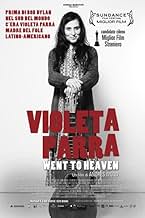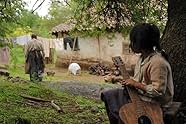IMDb RATING
7.1/10
2.4K
YOUR RATING
A portrait of famed Chilean singer and folklorist Violeta Parra, filled with her musical work, her memories, her loves, and her hopes.A portrait of famed Chilean singer and folklorist Violeta Parra, filled with her musical work, her memories, her loves, and her hopes.A portrait of famed Chilean singer and folklorist Violeta Parra, filled with her musical work, her memories, her loves, and her hopes.
- Awards
- 15 wins & 10 nominations
María Victoria Carvajal
- Doble de Manos Arpillera
- (as Mª Victoria Carvajal)
Lucas Quadros
- Niño Circo
- (as Lucas Cuadra)
Storyline
Did you know
- TriviaChile's official submission to the Best Foreign Language Film category of the 84th Academy Awards 2012.
- ConnectionsReferenced in El Visionario: Francisca Valenzuela (2011)
Featured review
The film has, what I assume to be, a deliberately rough look to it, not at all polished, or commercial. It is meant to be raw, and by implication, honest. I was going to write about the story jumping around on the timeline, but really it is more of a collage, almost as if the movie was a rush of memory, triggered by something sensual. A Proustian rush, perhaps, as Charlotte Rampling once said in a movie. Or is it Parra's life going by at the brink of death?
When first Violeta sings - and it is the actress portraying Violeta singing - the heart leaps with the voice, and the words! The movie doesn't bother to iterate the political reality of the world in Parra's time, instead it allows the songs tell you what you need to know. Oh, but then the songs get interrupted by snippets of conversation, and the thread becomes tangled.
I have to be honest, three quarters of an hour into the movie and I was getting annoyed at how disorientating this patchwork approach to the narrative was proving to be. Violeta in the mirror putting on lipstick, as a little girl looking in a cracked mirror, at another time as an adult without make-up, all in quick succession. What exactly is the point of following one upon the other? Violeta's eye in close-up. A chicken's eye in close-up. One second we're somewhere, then somewhere else, and is the second chronologically before the first, or what? It's disorientating, and although there may be an artistic impulse behind such an approach, it actually serves to keep the spectator at a disrespectful distance, so that one wonders, why am I being subjected to these fragmentary scenes from the life of a woman whose behaviour, moods, ideas, which are supposed to be rooted in folklore and thus of the people, are being withheld from me, in a sense, so that I start to resent her? At such a point of, maybe alienation is too strong a word, I started to yearn for the real voice of Parra, which has an otherworldly melancholy, a ghostliness in the final recordings, and the actress' interpretation, good as it is, misses that.
The DVD I got, sourced from Korea, has English subtitles, admittedly with a few errors in the writing, and wonky lettering at times, but nothing serious, perfectly legible. Then again, they're not always around when you want them. For example, early on, Violeta asks an old man to teach her hsi songs, but he refuses, and we learn this is because of a death in the family. Later, we see him singing but the subtitles don't materialise. Nonetheless, it's basically Chilean Blues, and we all can get the spirit of the Blues. The pain of the people.
I guess it's worth seeing, in the absence of a decent documentary that has English subtitles. A frustrating portrait of a frustrating genius.
When first Violeta sings - and it is the actress portraying Violeta singing - the heart leaps with the voice, and the words! The movie doesn't bother to iterate the political reality of the world in Parra's time, instead it allows the songs tell you what you need to know. Oh, but then the songs get interrupted by snippets of conversation, and the thread becomes tangled.
I have to be honest, three quarters of an hour into the movie and I was getting annoyed at how disorientating this patchwork approach to the narrative was proving to be. Violeta in the mirror putting on lipstick, as a little girl looking in a cracked mirror, at another time as an adult without make-up, all in quick succession. What exactly is the point of following one upon the other? Violeta's eye in close-up. A chicken's eye in close-up. One second we're somewhere, then somewhere else, and is the second chronologically before the first, or what? It's disorientating, and although there may be an artistic impulse behind such an approach, it actually serves to keep the spectator at a disrespectful distance, so that one wonders, why am I being subjected to these fragmentary scenes from the life of a woman whose behaviour, moods, ideas, which are supposed to be rooted in folklore and thus of the people, are being withheld from me, in a sense, so that I start to resent her? At such a point of, maybe alienation is too strong a word, I started to yearn for the real voice of Parra, which has an otherworldly melancholy, a ghostliness in the final recordings, and the actress' interpretation, good as it is, misses that.
The DVD I got, sourced from Korea, has English subtitles, admittedly with a few errors in the writing, and wonky lettering at times, but nothing serious, perfectly legible. Then again, they're not always around when you want them. For example, early on, Violeta asks an old man to teach her hsi songs, but he refuses, and we learn this is because of a death in the family. Later, we see him singing but the subtitles don't materialise. Nonetheless, it's basically Chilean Blues, and we all can get the spirit of the Blues. The pain of the people.
I guess it's worth seeing, in the absence of a decent documentary that has English subtitles. A frustrating portrait of a frustrating genius.
- HuntinPeck80
- Feb 16, 2024
- Permalink
- How long is Violeta Went to Heaven?Powered by Alexa
Details
- Release date
- Countries of origin
- Official sites
- Languages
- Also known as
- Violetta Went to Heaven
- Filming locations
- Louvre Museum, Paris, France(aka Musée du Louvre, Paris 1, Paris, France)
- Production companies
- See more company credits at IMDbPro
Box office
- Gross US & Canada
- $21,496
- Opening weekend US & Canada
- $5,588
- Mar 31, 2013
- Gross worldwide
- $1,466,032
- Runtime1 hour 50 minutes
- Color
Contribute to this page
Suggest an edit or add missing content

Top Gap
By what name was Violeta Went to Heaven (2011) officially released in India in English?
Answer
























